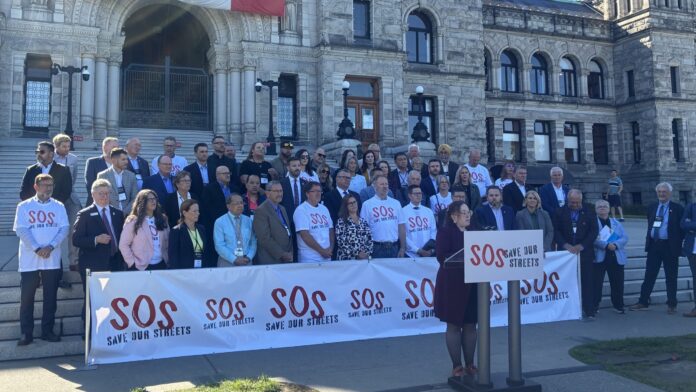Mayors from across British Columbia are calling on the province to take urgent action to address the homelessness and addiction crisis facing their communities.
They held a rally Wednesday afternoon in front of the B.C. legislature, organized by the advocacy group Save our Streets.
The event took place on the sidelines of the annual c (UBCM) convention in Victoria.
Prince George councillor and incoming UBCM president c acknowledged the province has taken some meaningful steps to address homelessness, like the Heart & Hearth program to respond to encampments.
“Unfortunately, the gaps in service have become so great that communities across B.C. now have a chronic issue with homelessness and street disorder,” said Ramsey.
She pointed to a suspected arson last week that damaged a popular brewery in downtown Prince George.
Nanaimo Mayor Leonard Krog said of the nearly 1000 unhoused people in his community, only about 20 per cent have access to a shelter.
“We have thousands of British Columbians living in hell on our streets, and they’re making it hell for everybody else,” said Krog. “We can fix this if we work together.”
He said part of that solution should be expanded involuntary care for certain individuals with severe mental health issues.
B.C. currently has about 2,100 involuntary care beds, out of the more than 21,000 mental health beds across the province.
Kelowna Mayor c said crime has declined in his city since 2022, but the community still bears costly impacts from a handful of repeat chronic offenders.
“This is a reality that all communities across the province are being left to manage on their own,” said Dyas.
“While municipalities can invest in more bylaw, policing, and security, municipalities cannot change laws, solve the root causes, or provide the healthcare services that are needed. That responsibility lies with the province and the federal governments,” he said.
Dyas said the group has three key requests: more Crown prosecutors to raise B.C.’s charge rate for crimes, bail reform to hold chronic offenders accountable, and “compassionate” involuntary care.
“In our current system, vulnerable people who pose a danger to themselves and others are left cycling between the streets, shelters, hospitals, and jails,” said Dyas. “It is not safe, and it is not fair to those individuals.”

The issues around homelessness and addictions have dominated discussions at the UBCM convention. A panel on Monday heard calls from local leaders and front-line advocates for the province to step up action to tackle the interconnected issues that have led to street disorder in downtown communities.
“I share these frustrations and the deep concerns of municipal leaders, of the business community, in terms of the impacts of public disorder on communities,” B.C. Public Safety Minister Nina Krieger told reporters Wednesday.
“I am working on all fronts to tackle crime, ensuring that the police have the tools and the resources that they need to tackle street disorder and other crimes,” she said.
She pointed to initiatives like Special Investigation and Targeted Enforcement (SITE). The provincially-funded three-year program was launched in 2023 to enhance police operations targeting repeat violent offenders.
The province also announced the Community Safety and Targeted Enforcement (C-STEP) program earlier this year, which provides police with more resources to tackle property crimes.
Krieger noted that data from Statistics Canada shows B.C.’s crime severity index fell by about 11 per cent in 2024, compared to the previous year.
“In some cases, there have been demonstrated improvements. That does not mean that there is not more work to be done, and we are committed to doing that work each and every day in partnership with all levels of government.” said Krieger.






